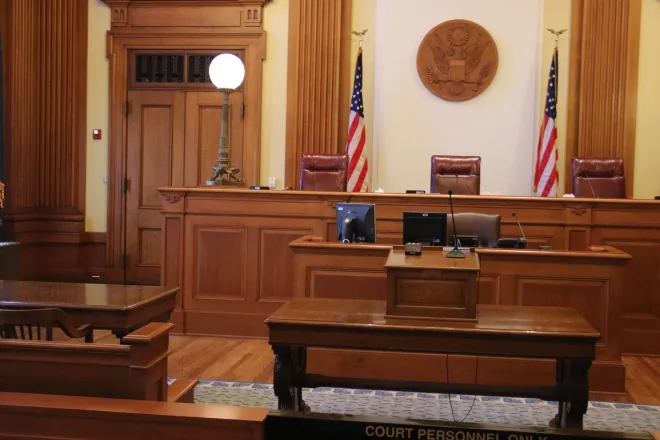
Daily Audio Newscast - May 30, 2025
© AlexLMX - iStock-823000260
Six minutes of news from around the nation.
Trump's visa clampdown plunges 275,000 Chinese students in U.S. into uncertainty; HIV testing, outreach falter in MS amid federal funding cuts; WV residents could foot bill for VA data center infrastructure; MI senator sponsors tax credit, cash allowance bills to help families.
Transcript
The Public News Service Daily Newscast, May 30, 2025.
I'm Mike Clifford.
More than a quarter million Chinese students attending college in the U.S. saw their future plunged into uncertainty Wednesday, when the Trump administration announced an aggressive clampdown on student visa holders from that country.
That from the Washington Post.
Their report with an estimated 277,000 students pursuing primarily undergraduate and graduate degrees, China ranks only behind India, among foreign countries with the highest number of students attending college in the U.S.
Next to Mississippi, a state that is feeling the impact of federal funding cuts to HIV prevention programs that are sweeping the South.
That's according to reporting from KFF Health News.
For years, federal dollars have been the backbone of HIV prevention and testing efforts in the state where infection rates remain disproportionately high.
Now as funding evaporates, organizations like My Brother's Keeper and the Southern AIDS Coalition say the consequences could be dire.
June Gibson, CEO of My Brother's Keeper, describes the abrupt loss of funds.
So it's been pretty devastating to us to not have that support that we've had, I mean, throughout the years.
And we built programs around the structure of the federal government and state government as relates to HIV and STD prevention.
And now that structure that we've had for practically 20 years is gone.
The CDC has said it remains committed to ending HIV despite current fiscal realities.
But Gibson says the funding cuts have already forced her group to close Gulfport services and reduce free testing statewide.
Mississippi already leads the nation in sexually transmitted disease rates.
This story was produced with original reporting from Amy Maxman for KFF Health News.
I'm Tramiel Gomes.
And an influx of data center infrastructure in neighboring Virginia will likely leave the mountain state with higher energy bills, according to a new report from the Institute for Energy Economics and Financial Analysis.
Regional grid operator PJM has proposed building two new high voltage transmission lines to increase power capacity for data centers beginning in 2027.
Both lines would cut through parts of West Virginia, says Kathy Kunkel with the Institute.
She explains data centers are massive computing facilities used by artificial intelligence, cloud computing, and other large scale computing industries.
West Virginia rate payers are served by subsidiaries of two utilities, First Energy and American Electric Power.
We found that West Virginia rate payers are gonna be contributing over $440 million to the cost of those transmission lines, even though the benefit is to data centers and the tech industry.
Kunkel notes that the multimillion dollar price tag for the lines was determined by estimating the annual cost or revenue requirement of each of the two transmission lines during their useful life, and then allocating the costs to the utilities.
Nadia Ramligan reporting.
This is public news service.
As families in Michigan and elsewhere struggle with daily living expenses, bills introduced earlier this month could alleviate their financial burden.
Senate bills 308 and 313, also called the Building Blocks Plan, would provide a $550 tax credit to working families with children up to age three.
Another feature is the RX Kids Plan, a $1,500 cash allowance during pregnancy and $500 monthly through the child's first year.
Senator Sylvia Santana acknowledges that as childcare and grocery costs rise, wages have not been sufficient to sustain a family.
What we're doing with this package of bills is making sure that families don't have those concerns comes to being able to sustain their family financially.
So whether it be cutting the taxes for working families that don't receive a lot of income, I think that's really important to being able to give back to a place where they can feel supported in our state.
Santana, who sponsored the RX Kids plan, thinks the focus should be on the baby rather than worrying about affording diapers or rent.
Since 2015, Michigan has lost 40 percent of its child care capacity as young workers leave the workforce.
I'm Terry Dee reporting.
And meeting America's future energy demands requires big decisions by utilities and policy makers about the best way to do it.
Mitchell Tech has just hired a new instructor to lead its wind turbine technology program which had been paused for a reset.
Vice President for Academic Affairs Scott Fossum says there's a lot of demand for jobs in this field and they want to prepare students for newer skills needed such as repairing wind towers that have been operating for years.
There's so many wind farms around South Dakota, upper Midwest, they're still going to need technicians to make sure that everything is up and running, they still can be functional.
South Dakota often ranks second in the nation for wind energy generation.
I'm Mike Moen.
And finally, as New York lawmakers revisit the idea of having a medical aid in dying law, studies show racial disparities in end-of-life care options.
Research finds Asian-Americans, Native Hawaiians, and Pacific Islanders are less likely to know about or use hospice care, and this population is second highest in the nation in New York.
Ben DeGuzman, with the Washington, D.C. Mayor's Office, is the son of Filipino immigrants.
He says cultural beliefs, as well as language, can be barriers to conversations about death and dying.
Because our communities don't speak English at the same rate as other communities do, being able to talk to doctors is a problem. health insurers, especially within the context of death or dying legislation.
Many have marked AANH and PI Heritage Month in May.
New York's medical aid in dying law passed the State Assembly this month and awaits action in the Senate.
If it passes, New York would be the 11th state along with Washington DC to enact such legislation.
I'm Edwin J. Vieira.
This is Mike Clifford for Public News Service, member and listener supported.
Find our trust indicators at www.censusservice.org















